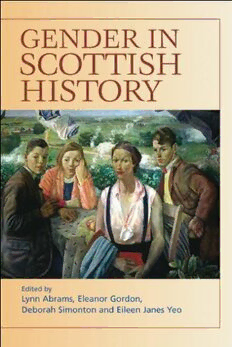
Gender in Scottish History Since 1700 PDF
289 Pages·2006·0.929 MB·English
Most books are stored in the elastic cloud where traffic is expensive. For this reason, we have a limit on daily download.
Preview Gender in Scottish History Since 1700
Description:
This book offers gendered perspectives on the main themes in Scottish history since 1700. It starts from the assumption that gender is integral to our understanding of the ways in which societies in the past were organised but that national histories have a tendency to be gender blind, to assume that the processes of nation-making have little to do with sexual difference. Politics and citizenship, nation-making, the imperial project, the Enlightenment, industrialisation, religion, education, and cultural production are processes or events which are far from being neutral in gender terms. On the contrary, as this book shows, they are coloured by assumptions about men and women, masculinity and femininity and the roles deemed appropriate to the sexes. And they had different impacts upon men and women. The book unsettles dominant ways of understanding Scotland's past. It reveals the constructions of maleness concealed in conventional history and restores women to the narrative. It questions the significance of the accepted turning points in Scottish history and offers alternative readings of the main movements of change. It draws on materials from across Scotland, and by shifting emphasis from the industrial-political central belt to the Highlands and Islands, offers a balanced perception of the country as a whole.
See more
The list of books you might like
Most books are stored in the elastic cloud where traffic is expensive. For this reason, we have a limit on daily download.
